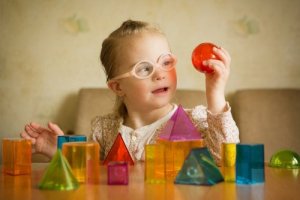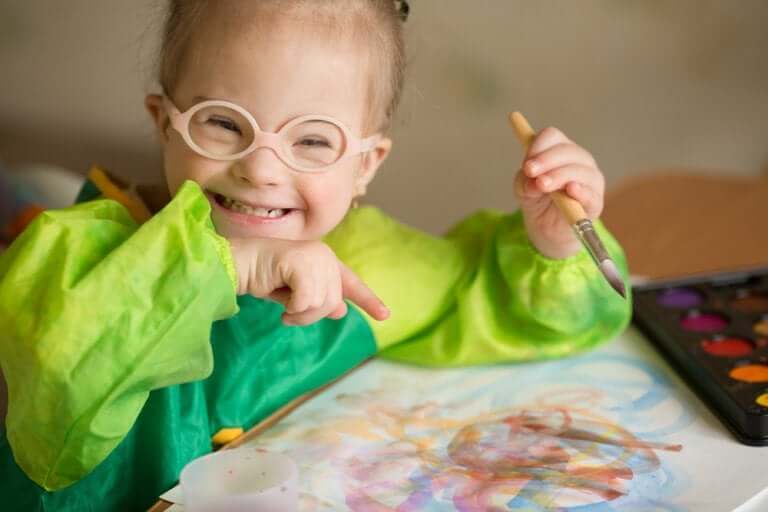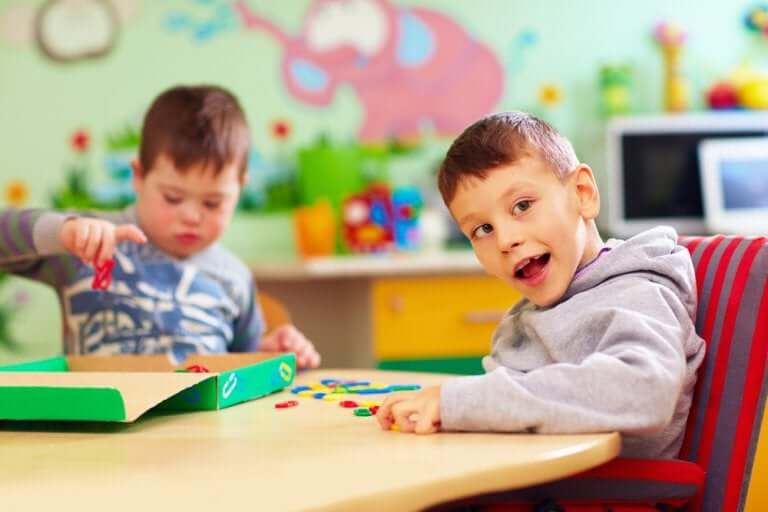How to Cope If Your Child Has a Learning Disability

While parents are waiting for their baby to be born, they tend to imagine a series of expectations about the child’s appearance, personality, capacities, etc. But, when the child is born with a disability, they have to come to terms with this new situation. For this reason, we’ve prepared the following article on how to deal with a child’s learning disability.
Home education is essential when bringing up children with a learning disability, in order to help them grow and mature and give them the best start in life. It’s important to treat them fairly, and to take into account their limitations. However, you shouldn’t go to the other extreme and overprotect them.
To have a special child means you need to become a teacher to educate them, a doctor to attend to them, a lawyer to represent them and a lioness to defend them.
– Flavia Pascual –

What does learning disability mean?
Currently, a learning disability is understood as the existence of a significantly lower level of development than expected for the chronological age of the person, in the following two areas:
- Intellectual functioning
- Adaptive behaviors
In addition, these children usually show the following symptoms:
- Problems in carrying out gross and fine motor skills
- Muscle hypotonia (commonly known as floppy baby syndrome)
- Difficulties in relating to their physical environment
- Problems when establishing social and communicative interactions
- Difficulties in developing their personal independence and autonomy
How to deal with a child’s learning disability
To come to terms with the fact that you have a child with a learning disability is often very complicated, and you can even go through a type of mourning. Because of this, in these cases you need to have specialists around you to help you adapt.
This is beneficial both for the child and for the parents, since they all need advice to come to terms with the situation they will need to live through.
The understanding of the diagnosis is important, and you should contact specialists and associations to be a source of support for you. In this way, parents can:
- Learn observation and intervention strategies
- Acquire stimulation and parenting skills
- Develop skills to understand and interpret the child’s behavior
- Have the necessary information about learning disabilities
- Get in touch with other families that are in the same situation
Parents will need all this knowledge and help in order for their child to progress correctly in every aspect of their life, and to cope in the best way possible with the learning disability. But, at the same time, parents shouldn’t be overprotective of their child, nor should they underestimate their abilities.
Help for the parents
Likewise, parents should ask for advice and counseling regarding their own relationship. It’s quite common for their relationship to deteriorate due to the constant stress, conflicts and disagreements while bringing the child up. There is also the possibility that one or both of the parents will feel completely overwhelmed by the whole situation.
In addition to this, we need to understand how to deal with friends and the extended family (grandparents, uncles, cousins, etc.). They also need to understand the situation as well as the child’s behavior.
What’s special about me are parents and surroundings that have fought for me to make me as self-sufficient as possible.
– Pablo Pineda –

Disability: a different path
The birth of a child is a time of change in the life of any person. It’s the point when the path of motherhood or fatherhood begins. However, if the baby has some sort of learning difficulty, it will catch the parents completely unaware. And so, the path becomes quite a different path from the one you were expecting – a path along which you’ll need to respond to the specific needs of the child.
Because of this, mothers and fathers of children with learning disabilities need guidance to improve their child’s quality of life, as well as that of their own and their family’s.
Finally, it’s worth mentioning Pablo Pineda, a teacher, conference speaker, and actor, and the first European with Down’s Syndrome to achieve a university degree. He has shown himself to be a supreme example of how to overcome learning difficulties.
There are no people with disabilities, just people with different abilities.
– Pablo Pineda –
This phrase should be implanted in the minds of all mothers and fathers of children with learning disabilities. In that way, they’ll be able to trust in their child’s qualities and abilities, and empower them to achieve great things in their lives.
While parents are waiting for their baby to be born, they tend to imagine a series of expectations about the child’s appearance, personality, capacities, etc. But, when the child is born with a disability, they have to come to terms with this new situation. For this reason, we’ve prepared the following article on how to deal with a child’s learning disability.
Home education is essential when bringing up children with a learning disability, in order to help them grow and mature and give them the best start in life. It’s important to treat them fairly, and to take into account their limitations. However, you shouldn’t go to the other extreme and overprotect them.
To have a special child means you need to become a teacher to educate them, a doctor to attend to them, a lawyer to represent them and a lioness to defend them.
– Flavia Pascual –

What does learning disability mean?
Currently, a learning disability is understood as the existence of a significantly lower level of development than expected for the chronological age of the person, in the following two areas:
- Intellectual functioning
- Adaptive behaviors
In addition, these children usually show the following symptoms:
- Problems in carrying out gross and fine motor skills
- Muscle hypotonia (commonly known as floppy baby syndrome)
- Difficulties in relating to their physical environment
- Problems when establishing social and communicative interactions
- Difficulties in developing their personal independence and autonomy
How to deal with a child’s learning disability
To come to terms with the fact that you have a child with a learning disability is often very complicated, and you can even go through a type of mourning. Because of this, in these cases you need to have specialists around you to help you adapt.
This is beneficial both for the child and for the parents, since they all need advice to come to terms with the situation they will need to live through.
The understanding of the diagnosis is important, and you should contact specialists and associations to be a source of support for you. In this way, parents can:
- Learn observation and intervention strategies
- Acquire stimulation and parenting skills
- Develop skills to understand and interpret the child’s behavior
- Have the necessary information about learning disabilities
- Get in touch with other families that are in the same situation
Parents will need all this knowledge and help in order for their child to progress correctly in every aspect of their life, and to cope in the best way possible with the learning disability. But, at the same time, parents shouldn’t be overprotective of their child, nor should they underestimate their abilities.
Help for the parents
Likewise, parents should ask for advice and counseling regarding their own relationship. It’s quite common for their relationship to deteriorate due to the constant stress, conflicts and disagreements while bringing the child up. There is also the possibility that one or both of the parents will feel completely overwhelmed by the whole situation.
In addition to this, we need to understand how to deal with friends and the extended family (grandparents, uncles, cousins, etc.). They also need to understand the situation as well as the child’s behavior.
What’s special about me are parents and surroundings that have fought for me to make me as self-sufficient as possible.
– Pablo Pineda –

Disability: a different path
The birth of a child is a time of change in the life of any person. It’s the point when the path of motherhood or fatherhood begins. However, if the baby has some sort of learning difficulty, it will catch the parents completely unaware. And so, the path becomes quite a different path from the one you were expecting – a path along which you’ll need to respond to the specific needs of the child.
Because of this, mothers and fathers of children with learning disabilities need guidance to improve their child’s quality of life, as well as that of their own and their family’s.
Finally, it’s worth mentioning Pablo Pineda, a teacher, conference speaker, and actor, and the first European with Down’s Syndrome to achieve a university degree. He has shown himself to be a supreme example of how to overcome learning difficulties.
There are no people with disabilities, just people with different abilities.
– Pablo Pineda –
This phrase should be implanted in the minds of all mothers and fathers of children with learning disabilities. In that way, they’ll be able to trust in their child’s qualities and abilities, and empower them to achieve great things in their lives.
All cited sources were thoroughly reviewed by our team to ensure their quality, reliability, currency, and validity. The bibliography of this article was considered reliable and of academic or scientific accuracy.
- Asociación Americana de Discapacidades Intelectuales y del Desarrollo-AAIDD. (2010). Discapacidad intelectual: Definición, clasificación y sistemas de apoyo. Madrid: Alianza.
- Candel-Gil, I. (2005). Elaboración de un programa de atención temprana. Electronic Journal of Research in Educational Psychology, 3(7), 151-192.
- Guevara Benítez, Y. y Soto, E. G. (2012). Las familias ante la discapacidad. Revista electrónica de psicología Iztacala, 15(3), 1023-1050.
- Tamarit, J. (2009). Atención Temprana: avanzando hacia un modelo inclusivo orientado a la calidad de vida familiar y al desarrollo de competencias personales significativas tanto en los niños y niñas como en sus familias. Madrid: FEAPS.
This text is provided for informational purposes only and does not replace consultation with a professional. If in doubt, consult your specialist.








